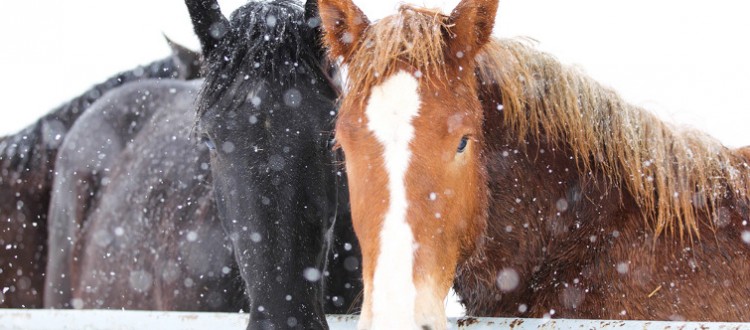Caring For Your Horse During Winter
Despite being quite hardy in cold conditions, horses and ponies need extra care and attention to keep them comfortable during the winter months. Now is a great time to start thinking about what you need to keep your horse happy and healthy for the season ahead, so we’ve listed our top tips and care advice below to help you get prepared. By planning now, you can ensure that you’ll have everything ready for when the cold weather sets in.
Food
- An extra layer of fat will help to keep your horse warm during winter, so you should boost their calorie intake with a feed supplement high in oil. Vitamin and mineral supplements can also help to meet your horse’s nutritional needs and keep them healthy.
- Brown grass holds very little nutrition, so if your horse is living out full time you will need to put some good quality hay in a feeding rack for them to help meet their needs. Remember to change this daily to prevent it getting wet. You will also need to increase their feed intake if they are working or competing.
- High fibre foods that require a lot of chewing can help to keep your horse occupied when they are stabled. Offer different varieties of food with different textures to provide stimulation.
- Having access to fresh, clean water is still just as important during winter. In low temperatures you will need to insulate your horse’s water bucket to prevent it from freezing.
Shelter
- Good ventilation is essential for stabled horses, otherwise respiratory problems can occur. You can prevent this by using low dust bedding and ensuring fresh air is able to enter the stable.
- Make sure the stable is clean and comfortable. Muck it out regularly, use rubber mats to provide comfort and use straw for warm bedding.
- If you are stabling your horse, they still need to be let out as much as possible so they get enough exercise. They should have plenty of opportunities to run around in the paddock and socialise with other horses if possible.
- You need to make sure your horse has adequate shelter from the wind whilst in the paddock. Hedges and trees can provide a natural shelter, but you may need to build a more substantial shelter if it’s forecast to be a bad winter.
- Double check that your fences are in good enough condition to withstand bad weather and stop your horse escaping.
- Horses grow a winter coat to help keep them warm, but rugs are a good idea top help them withstand cold conditions, snow and rain, especially if they are clipped, old, underweight or ill. If you rug your horse, be sure to remove it once a day to prevent them from overheating.
Care
- Your horse should be de-wormed before winter sets in so optimum digestion can take place.
- Cold weather takes a toll on your horses feet, so proper hoof care is especially important in wintertime. You should clean your horse’s feet well, and apply petroleum jelly to prevent snow and ice from forming in their hooves.
- Horses are more prone to mud fever and and rain scald during winter, so you will need to check their skin daily for signs of infection and get treatment for these conditions if they occur. Preventative products are available to help lesson the risk.
- Aim to spend as much time with your horse as you usually do during spring and summer. They are companion animals, so a lack of interaction can have a negative impact on their welfare. A radio playing, goats, barn cats or another horse can provide companionship too.
We hope this article is useful to you. For further advice, click here. If you have any tips that you would like to share with us, please let us know on Facebook and Twitter pages!
To learn more about Racehorse Rescue Centre click here. If you would like to donate to our cause please click here.



